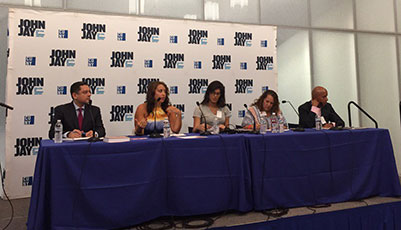
On Sept. 22, leading scholars, practitioners, activists, lawyers, and policy analysts gathered in the Moot Court room for a day of panel discussions and conversations as part of the first Latina/os and Criminal Justice conference at John Jay College. Hosted and organized by Professor José Luis Morín of the Department of Latin American and Latina/o Studies, the conference coincided with the release of Latinos and Criminal Justice: An Encyclopedia (Greenwood Press, 2016), of which Morín is the editor.
 The encyclopedia is the first comprehensive collection of essays and entries in its field, and has been described by the website Booklist as “a thoroughly researched, informative, and all-inclusive reference source.” Morín has been putting the encyclopedia together for several years, and said excitedly of its publication, “It couldn’t have come out at a better time, given the current political climate.” The extensive new volume, which will soon be available in academic libraries across the country, includes writings on immigration, crime, the drug trade and drug use, U.S.-Mexico border relations, policing, and incarceration, among numerous other subjects.
The encyclopedia is the first comprehensive collection of essays and entries in its field, and has been described by the website Booklist as “a thoroughly researched, informative, and all-inclusive reference source.” Morín has been putting the encyclopedia together for several years, and said excitedly of its publication, “It couldn’t have come out at a better time, given the current political climate.” The extensive new volume, which will soon be available in academic libraries across the country, includes writings on immigration, crime, the drug trade and drug use, U.S.-Mexico border relations, policing, and incarceration, among numerous other subjects.
Several of the authors who contributed to the encyclopedia served as presenters at the conference, including John Jay professors Isabel Martínez and Luis Barrios. Morín emphasized that there is widespread misinformation on Latina/os in criminal justice, and by way of example he noted how some media reports and Republican Presidential nominee Donald Trump regularly call attention to what they perceive to be a high influx of Mexican immigrants streaming across the border, when in fact the opposite is true. A Pew Research Center study concluded that since 2009, there have been more Mexicans going back to Mexico than coming into the United States. Other research presented at the conference illustrated that Latina/o immigrants to the United States are less likely to commit crimes and get arrested than their U.S.-born counterparts.
“The fact that we’re often talking about these issues without the proper or adequate information has a devastating effect on Latino communities because it affects policy and practices,” said Morín.
Other conference sessions focused on Latina/os in the media, including the negative stereotypes of Latinos as bandits or as sexually threatening to white women. Morín described a connection between early Hollywood and news media stereotypes and the more recent Central Park Five case, in which one Latino and four black men were falsely accused of raping a white woman, and were wrongly imprisoned for several years. Media reports at the time characterized the young men of color as a “wolf pack,” which Morín says is typical of the kind of racial stereotyping that the conference worked to oppose.
 As the conference progressed, the focus broadened, with participants speaking about the subject on a grassroots level, sharing personal anecdotes and experiences. Several audience members stood up to share their own experiences as Latina/os caught up in the criminal justice system. “That’s what made this conference so unique and successful,” said Morín, “is that we covered both the facts and the human dimension as well.”
As the conference progressed, the focus broadened, with participants speaking about the subject on a grassroots level, sharing personal anecdotes and experiences. Several audience members stood up to share their own experiences as Latina/os caught up in the criminal justice system. “That’s what made this conference so unique and successful,” said Morín, “is that we covered both the facts and the human dimension as well.”
Echoing the shared feeling among audience members that criminal justice issues faced by Latina/os often go underreported in the media, presenter Julio Medina, founder of Exodus Transitional Community, said, “A Latino conference on criminal justice is historic and groundbreaking in its field.”
The conference was sponsored by the Latin American and Latina/o Studies Department and LatinoJustice PRLDEF under the leadership of its president and general counsel, Juan Cartagena, with additional co-sponsorship from: the Drug Policy Alliance; the U.S. Department of Education’s UISFL program; La Voz; John Jay’s Latin American Students Organization and Youth Justice Club; the Social Justice Project (SoJust), and MBJ Food Services.



